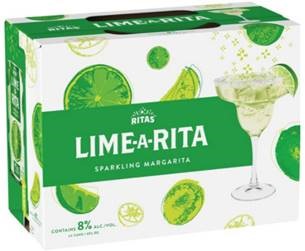Class-Action Filed Against Anheuser-Busch Alleges ‘Rita’ Malt Beverage Products Mislead Consumers
A new class-action lawsuit alleges that packaging for Anheuser-Busch’s “Rita” beverage products deceives consumers by implying that the products contain wine or distilled spirits when in fact they are flavored malt beverage products.
Plaintiffs are seeking disgorgement of profits, unspecified damages, attorneys’ fees, and an order requiring Anheuser-Busch to revise its marketing for the Rita products and engage in a corrective advertising campaign.
Anheuser-Busch’s Advertising
The complaint primarily targets multipack cardboard packaging for Anheuser-Busch’s Rita products. The Rita products include margarita-flavored products sold under the names Lime-A-Rita, Straw-Ber-Rita, and Peach-A-Rita, among others; mojito-flavored products sold under the name Ritas Mojito Fizz; sangria-flavored products sold as Ritas Sangria Spritz; and rosé-flavored products sold as Ritas Rosé Spritz.

Packaging for these products displays the name and imagery of the cocktails that inspire the flavors of the beverages. For example, packaging for the margarita-flavored products features the text “sparkling margarita” and an image of a margarita. Similarly, packaging for the mojito-flavored products features the text “sparkling classic cocktails” and packaging for the sangria-flavored and rosé-flavored products features the words “Sangria” and “Rosé” along with images of wine glasses. While the packaging does disclose that the products are “Flavored Malt Beverage[s],” this disclosure appears on the bottom panel of the packaging, which the plaintiffs claim is not sufficiently conspicuous. The complaint also states that reasonable consumers would assume that “margarita” products contain tequila, rosé and sangria products contain wine, and mojito products contain rum.
The plaintiffs also allege that Anheuser-Busch’s packaging violates federal regulations governing advertising of malt beverages. While the regulations permit the use of a cocktail name as a brand name or fanciful name of a malt beverage, such names are only permissible if the overall label does not present a misleading impression about the identity of the product.
Anheuser-Busch responded to the complaint by stating that the lawsuit is without merit as the Ritas product names and images convey the margarita, mojito, rosé, spritz, and sangria flavors included in the alcoholic beverages. Anheuser-Busch noted that “the Rita family of products is a well-known line of malt beverages enjoyed by consumers for their flavor-packed refreshment.”
Regulatory Considerations
The distinction between flavored malt beverage products and wine or distilled spirits products may impact where the product can be sold. In New York, for example, flavored malt beverages may be sold in grocery stores, while wine and distilled spirits are restricted to liquor stores. Thus, the Rita line of malt beverage products can reach significantly more consumers than similarly-positioned products that contain wine or distilled spirits.
Primary Takeaway
Regardless of the outcome, this case shows that plaintiffs’ attorneys, as well as alcoholic beverage regulators, are on the lookout for potentially misleading marketing statements and images on the packaging of alcoholic beverages. Both alcoholic beverages and non-alcoholic beverages have been targeted by litigants related to arguably misleading imagery on beverage packaging and bottles.
Contacts
- Related Practices



